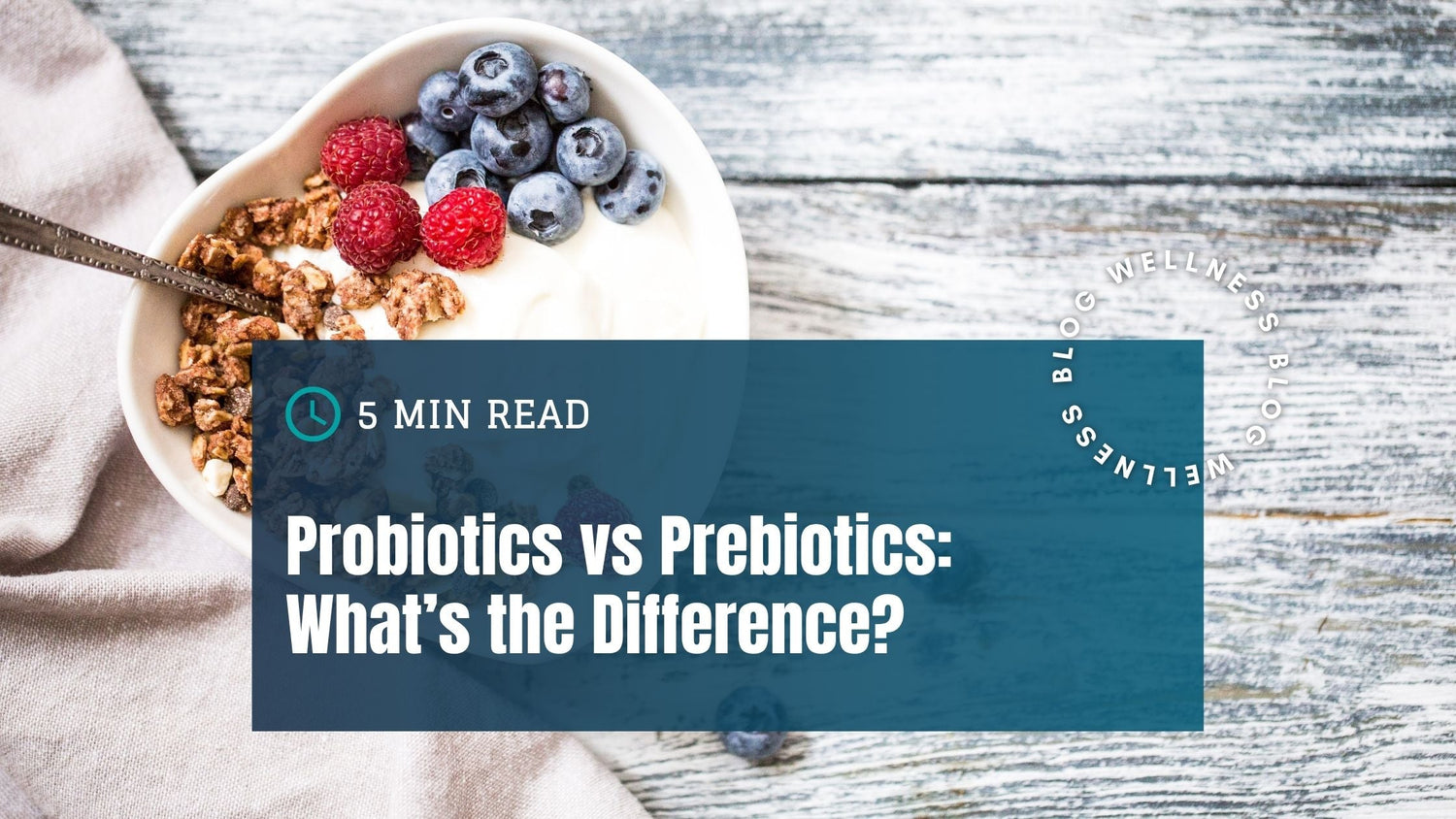Probiotics vs Prebiotics: What’s the Difference? It’s a question that often comes up when people start paying closer attention to gut health — and for good reason. The gut is more than just a digestion hub; it’s a central player in immunity, energy regulation, mental well-being, and even how our bodies absorb nutrients. Understanding the distinction between probiotics and prebiotics is key to optimising this complex ecosystem and supporting long-term health.
At the simplest level, probiotics are live microorganisms — often referred to as “good bacteria” — that help maintain a healthy balance in your gut microbiome. Prebiotics, on the other hand, are specific types of dietary fibre that act as food for those beneficial bacteria. They don’t contain bacteria themselves, but without them, probiotics can’t thrive. Think of probiotics as the garden plants and prebiotics as the rich soil and nutrients that keep them alive.
How the Gut Microbiome Shapes Health
Your gut contains trillions of microbes that work synergistically to digest food, produce vitamins, and regulate inflammation. A 2016 review published in Nature Reviews Gastroenterology & Hepatology highlighted that an imbalanced gut microbiome — known as dysbiosis — is associated with a range of health issues, from poor digestion and fatigue to obesity and mood disorders. This is why both probiotics and prebiotics have become major topics in nutrition and wellness research.
When you eat foods rich in probiotics — such as yoghurt, kefir, sauerkraut, or kimchi — you’re introducing beneficial bacteria directly into your digestive system. Prebiotics, found in foods like garlic, onions, leeks, bananas, and oats, feed the existing good bacteria and help them multiply. Together, they create a more stable and diverse microbiome, which can improve nutrient absorption, reduce bloating, and support a stronger immune response.
The Symbiotic Relationship Between Probiotics and Prebiotics
The relationship between these two is often described as symbiotic. Probiotics need fuel, and prebiotics provide exactly that. Without enough prebiotic fibre, probiotics can’t establish a lasting presence in your gut. This is why many high-quality gut health formulas today combine both, creating what’s known as a synbiotic — a supplement that contains both probiotics and prebiotics for optimal balance.
A 2020 clinical study published in Frontiers in Microbiology found that individuals who took a combination of prebiotic fibre and probiotic strains experienced greater improvements in gut microbial diversity and short-chain fatty acid production compared to those taking probiotics alone. These short-chain fatty acids, such as butyrate, play an essential role in reducing gut inflammation and maintaining the integrity of the intestinal barrier — both critical for long-term health.

Why Gut Health Extends Beyond Digestion
It’s easy to assume probiotics and prebiotics are just about smoother digestion, but their influence extends much further. The gut communicates constantly with the brain through the gut-brain axis — a network of nerves and biochemical signals that link the digestive system with emotional and cognitive centres of the brain. This connection helps explain why poor gut health is often linked to stress, anxiety, and low energy.
A balanced microbiome also plays a key role in metabolic health. Research has shown that gut bacteria can influence how the body manages blood sugar and stores fat. This is particularly relevant for people aiming to improve their metabolism, sustain energy levels, and support healthy aging — areas where combining good nutrition with targeted supplementation can make a real difference.
Supporting Gut Health Naturally
Building a healthier gut doesn’t require extreme diets or complicated routines. It comes down to consistency with simple habits — eating a variety of fibre-rich foods, staying hydrated, and reducing processed sugars that feed harmful bacteria. Including both probiotic-rich foods and prebiotic fibres daily can help restore balance within weeks.
For many people, adding a greens powder can provide an easy way to support both gut and overall health. Lifespan Supplements’ Greens Powder, for example, combines nutrient-dense superfoods and natural fibres that nourish your microbiome while also delivering vitamins, minerals, and antioxidants. It’s not a replacement for whole foods, but it’s an effective way to fill nutritional gaps and keep your gut environment thriving — especially if your diet or lifestyle isn’t perfectly consistent every day.
The Subtle but Crucial Difference
Understanding the difference between probiotics and prebiotics isn’t just a matter of terminology — it’s about recognising the unique roles each plays in sustaining gut balance. Probiotics are the live organisms that directly enhance your gut ecosystem, while prebiotics are the fibres that feed and sustain them. Both are essential, but neither can reach their full potential without the other.
So, when you think about Probiotics vs Prebiotics, it’s worth reframing the question. It’s not so much about which is better — it’s about how they work together to build a more resilient, efficient, and energised body from the inside out.
The Takeaway
The more we learn about the gut, the clearer it becomes that its influence extends to almost every aspect of well-being — from physical performance and mental clarity to longevity. By combining probiotic foods, prebiotic fibres, and smart supplementation like our Greens Powder, you can create a foundation for lasting health and vitality.
In short, your gut is a living ecosystem. Feed it, support it, and it will take care of you.
Please note that the referenced studies are for informational purposes only and are not directly linked to or endorsed by any Lifespan Supplements products.











